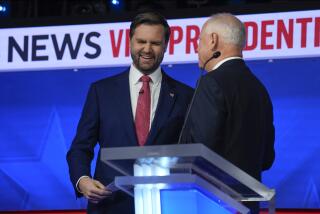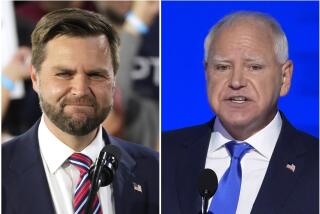Ideology, Chemistry Trump Geography
- Share via
There is no political axiom more venerated and none more outmoded and irrelevant than the one that decrees geography to be a leading criterion in the choice of a vice presidential candidate.
Oddly, though, most commentaries on the choices of running mates facing Vice President Al Gore and Texas Gov. George W. Bush rule out certain vice presidential hopefuls because the states from which they hail are said to be not important enough in terms of electoral votes, or already in the party’s column and unlikely to be captured by the other side, or in the same region of the country as the state of the man at the head of the ticket. Associated with these criteria of rejection is the widely held assumption that the vice presidential candidate is able to “deliver” his or her state’s electoral votes.
Like all assumptions, this one deserves closer examination. If a vice presidential candidate really did have independent power to bring a state into his party’s column in an election, the place to look for that effect would be not with the winning ticket because of the dominance of the standard-bearer, but rather with the losing party. Yet when we look at the 25 presidential elections since 1900, only in eight of those cases did the vice presidential candidate of the losing party score a home state victory. This occurred most recently in 1992, when Dan Quayle delivered Indiana to the losing campaign of President George Bush.
The list of those who delivered a state in a losing cause includes Walter Mondale, whose home state of Minnesota was carried in Jimmy Carter’s failed reelection bid in 1980. One of the odder aspects of Spiro Agnew’s political career is that in that same year, he was unable to deliver his own state of Maryland to Richard Nixon’s victorious campaign. He was, however, able to redeem himself in 1972.
The choice of Agnew by Nixon in 1968 points to one of the more sensible reasons for choosing a running mate: ideological balance. Improbable as it may seem, Nixon chose the Maryland governor in 1968 because he wanted a Republican moderate on the ticket. The very same Agnew who attacked the liberal press as “nattering nabobs of negativism” was chosen because he had defeated a segregationist named George Mahoney for the governorship of Maryland. Ronald Reagan’s choice of Bush in 1980 and Bush’s of Quayle in 1988 had more to do with ideological ticket-balancing than with Texas and Indiana, respectively. Experts seem to agree on the one clear-cut modern example of a vice presidential candidate bringing into the winners’ column a state that the head of the ticket would not have won on his own; ideology and religion also played a prominent role in John Kennedy’s selection of Lyndon Johnson.
In an age in which the personalities of the candidates and the issues they espouse are so prominent, geographical determinism leads in absurd directions. Does anyone seriously think that New York Gov. George Pataki could deliver his state to Bush or that Sen. Charles Robb would bring Virginia to Gore?
In this highly mobile society in which everything from television to fast food has been nationalized, where a candidate comes from is a debased currency. For Bush to choose Michigan Gov. John Engler over Nebraska Sen. Chuck Hagel because Engler’s state has 18 electoral votes and Hagel’s only five and because Michigan is more a swing state than Nebraska overlooks the greater personal appeal of the Nebraskan in a campaign that will be waged mostly on television.
Perhaps the most telling argument against geographical determinism is the most recent successful choice of a running mate: that of Gore by Bill Clinton. The proximity of Tennessee to Arkansas, its modest number of electoral votes and even the fact that Gore, like Clinton, was a party centrist, meant less to Clinton than the simple fact that he and Gore clicked. That is not the least compelling reason for making a vice presidential choice.
More to Read
Get the L.A. Times Politics newsletter
Deeply reported insights into legislation, politics and policy from Sacramento, Washington and beyond. In your inbox twice per week.
You may occasionally receive promotional content from the Los Angeles Times.










